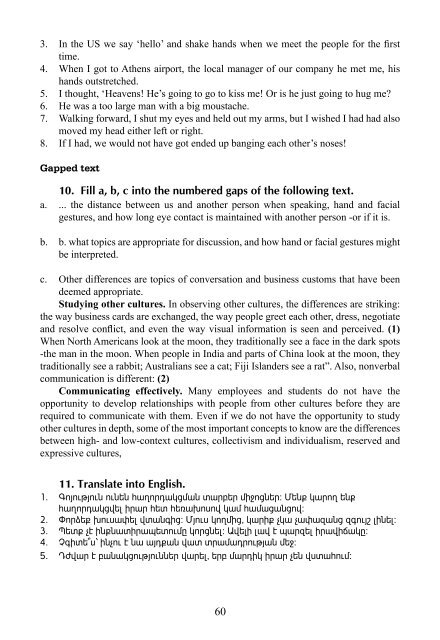Focus on Words
Focus on Words
Focus on Words
You also want an ePaper? Increase the reach of your titles
YUMPU automatically turns print PDFs into web optimized ePapers that Google loves.
3. In the US we say ‘hello’ and shake hands when we meet the people for the first<br />
time.<br />
4. When I got to Athens airport, the local manager of our company he met me, his<br />
hands outstretched.<br />
5. I thought, ‘Heavens! He’s going to go to kiss me! Or is he just going to hug me?<br />
6. He was a too large man with a big moustache.<br />
7. Walking forward, I shut my eyes and held out my arms, but I wished I had had also<br />
moved my head either left or right.<br />
8. If I had, we would not have got ended up banging each other’s noses!<br />
Gapped text<br />
10. Fill a, b, c into the numbered gaps of the following text.<br />
a. ... the distance between us and another pers<strong>on</strong> when speaking, hand and facial<br />
gestures, and how l<strong>on</strong>g eye c<strong>on</strong>tact is maintained with another pers<strong>on</strong> -or if it is.<br />
b. b. what topics are appropriate for discussi<strong>on</strong>, and how hand or facial gestures might<br />
be interpreted.<br />
c. Other differences are topics of c<strong>on</strong>versati<strong>on</strong> and business customs that have been<br />
deemed appropriate.<br />
Studying other cultures. In observing other cultures, the differences are striking:<br />
the way business cards are exchanged, the way people greet each other, dress, negotiate<br />
and resolve c<strong>on</strong>flict, and even the way visual informati<strong>on</strong> is seen and perceived. (1)<br />
When North Americans look at the mo<strong>on</strong>, they traditi<strong>on</strong>ally see a face in the dark spots<br />
-the man in the mo<strong>on</strong>. When people in India and parts of China look at the mo<strong>on</strong>, they<br />
traditi<strong>on</strong>ally see a rabbit; Australians see a cat; Fiji Islanders see a rat”. Also, n<strong>on</strong>verbal<br />
communicati<strong>on</strong> is different: (2)<br />
Communicating effectively. Many employees and students do not have the<br />
opportunity to develop relati<strong>on</strong>ships with people from other cultures before they are<br />
required to communicate with them. Even if we do not have the opportunity to study<br />
other cultures in depth, some of the most important c<strong>on</strong>cepts to know are the differences<br />
between high- and low-c<strong>on</strong>text cultures, collectivism and individualism, reserved and<br />
expressive cultures,<br />
11. Translate into English.<br />
1. Գոյություն ունեն հաղորդակցման տարբեր միջոցներ: Մենք կարող ենք<br />
հաղորդակցվել իրար հետ հեռախոսով կամ համացանցով:<br />
2. Փորձեք խուսափել վտանգից: Մյուս կողմից, կարիք չկա չափազանց զգույշ լինել:<br />
3. Պետք չէ ինքնատիրապետումը կորցնել: Ավելի լավ է պարզել իրավիճակը:<br />
4. Չգիտե՞ս` ինչու է նա այդքան վատ տրամադրության մեջ:<br />
5. Դժվար է բանակցություններ վարել, երբ մարդիկ իրար չեն վստահում:<br />
60
















